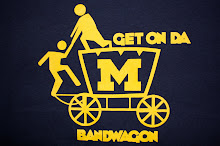Over the past 130 years, Michigan's football reputation was built on tradition, a track record of success and for always playing by the rules.
How much of hit that reputation sustains after the university admitted to four major violations of NCAA rules and self-imposed sanctions remains to be seen.
Sanctions don’t damage Michigan’s brand, argued athletic director Dave Brandon. Instead, he says they provide a sign the university is committed to integrity.
"I don't think this is a black eye - it's a bruise," Brandon said Tuesday. "We did some things wrong, some systems failed. But I refuse to believe it detracts from who we are and what we're about.
"Our history, our tradition and our value system is out there for the world to see. We've been in the business of football for 130 years and we'll allow our brand and our integrity and our merit stand on our history and our beliefs."
His open-book approach is one Farmington Hills-based marketing specialist Matt Friedman said will aid in the athletic department's efforts to maintain the reputation of honesty Michigan's fan base expects.
The NCAA sanctions are not Brandon’s first experience in damage control.
Last year, as the CEO of Dominos Pizza, he spearheaded the company's response to a YouTube video prank in which a pair of employees in a North Carolina store sneezed on pizzas, stuck cheese up their nose and performed other unsavory deeds to the company’s food before shipping it to customers.
Within days of the video's release, Dominos went on the offensive. It put company officials in front of cameras, addressed the situation and detailed steps taken to rectify the matter. The two employees were fired and criminal chargers were brought.
Friedman called Brandon's response the best example of crisis control he's ever seen, one that sets a precedent for the newly appointed athletic director's actions in addressing the NCAA allegations at Michigan.
"He made no bones about the fact that what happened was not acceptable - to him and to the university," said Friedman, a partner in Tanner Friedman public relations firm. "The fact that the athletic department and the university took this very seriously from the beginning is a very good sign to maintain the brand that has been established over the years."
Friedman said an organization's initial public-relations effort is often critical to how much damage is done to the brand in the long run.
Results at Michigan may have been different if more serious allegations, such as academic impropriety or criminal action was involved, but Friedman expects Michigan’s response will help buffer whatever minimal damage was done.
It may not be the overall consumer base that needed addressing.
Until 2008, Michigan ranked No. 2 nationally in NCAA-licensed material, trailing only Texas, according to the Collegiate Licensing Company. In the past two years, though, the school has dipped to seventh nationally, it remains the top Big Ten merchandise seller.
The key constituency that must be satisfied, according to Friedman, is the school’s corporate sponsors, especially when there are still luxury suites to sell after a $226 million renovation ofMichigan Stadium.
"The stakes are very high now," said Friedman.
While accepting responsibility for Michigan's violations, Brandon asked people to consider the program's entire body of work rather than focus on issues dealing with compliance and practice hours.
"Yes, we made mistakes," Brandon said Tuesday. "We are being transparent about it. We're accountable, we're doing something about it, we're going to be sure they don't happen again, but beyond that, I don't know what else we can do."




0 comments:
Post a Comment